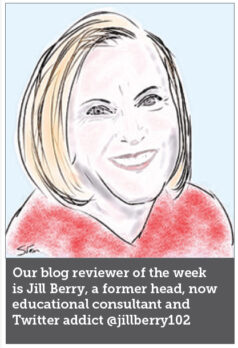Reviewer Jill Berry shares her top picks from the edu-blogosphere this week
Reflections upon our relationship with food
@DaringOptimist
There is a good deal of activity on Twitter and in blogs on the subject of wellbeing, including the highly successful #teacher5aday initiative and now regular posts from @HealthyToolkit. In this August post, Daring Optimist explores the subject of our relationship with food and how it connects with our physical and mental wellbeing.
The writer shares her personal experiences and recounts her changing attitude towards food over time, concluding: “When I was depriving my body of food and working out to the extreme, I was self-harming. I was trying to gain control of one area of my life when I lost it somewhere else. When I was comfort eating, I was self-harming too. I was trying to silence the chaos in my head by distracting myself with treats.”
She goes on to suggest three strategies which could be helpful if we are committed to developing a healthy approach to diet.
Invisible children
Dr Clare Owen
In this Huffington Post blog, Clare Owen discusses the existence of “invisible children” in our classrooms who, “whether cautious or coasting, are hidden in plain sight, working under their teachers’ radar, practically anonymous.” These children may “lack a label” and fail to register as having a specific learning need, and not attracting the attention we are aware certain groups of students require.
However, without recognition and a commitment on the part of the teacher to giving these pupils the support they require, they are unlikely to fulfil their academic potential. They may be introverts, and they may be anxious, shy or lonely. Dr Owen suggests that in a busy and pressured classroom situation, teachers may be tempted to allow the quiet children to remain invisible because they make no overt demands and are no trouble. Yet those who are quiet and well-behaved do not automatically achieve. They need more from us, and we should “notice them and give them a calm chance to shine.”
If we push children to become the readers we want them to be…
Robin Stevens, @redbreastedbird
Children’s author Robin Stevens begins by explaining what she hopes young readers will gain from her books. “I’d like them to teach children how to be kind, how to think more deeply about the world and how to be resourceful and brave in the face of the huge odds that life will throw at them. I’d hope that they will expand children’s vocabularies and broaden their minds,” she writes.
But she recognises that, if she is to achieve any of this, children need to enjoy her fiction and to be motivated to continue reading. She wonders whether, in our commitment to encouraging young people to read widely and ambitiously, we lose sight of the enjoyment and risk putting them off reading altogether.
She suggests the books we read should be age-appropriate in a way which stretches us: “Reading is not a ladder. It is a universe”. If children are enjoying reading, and rereading books they love, perhaps we should accept this and not push too hard too soon.
Why aren’t I a better teacher?
@MrSamPullan
Finally this week, I enjoyed the honesty and openness of this post by Sam Pullan. I am fond of saying that, in my experience, the best teachers always want to be better teachers. Sam’s post made me think more deeply about our motivation to succeed and the less comfortable elements of competition, rivalry between and ranking of teachers, especially in exam results season. Sam recognises he is generous in sharing resources and expertise throughout the year, and yet results days “bring the usual question: why hasn’t my obvious teaching genius been reflected in uniformly jaw-dropping results – particularly when compared to those of colleagues?” Does this strike a chord?













Your thoughts